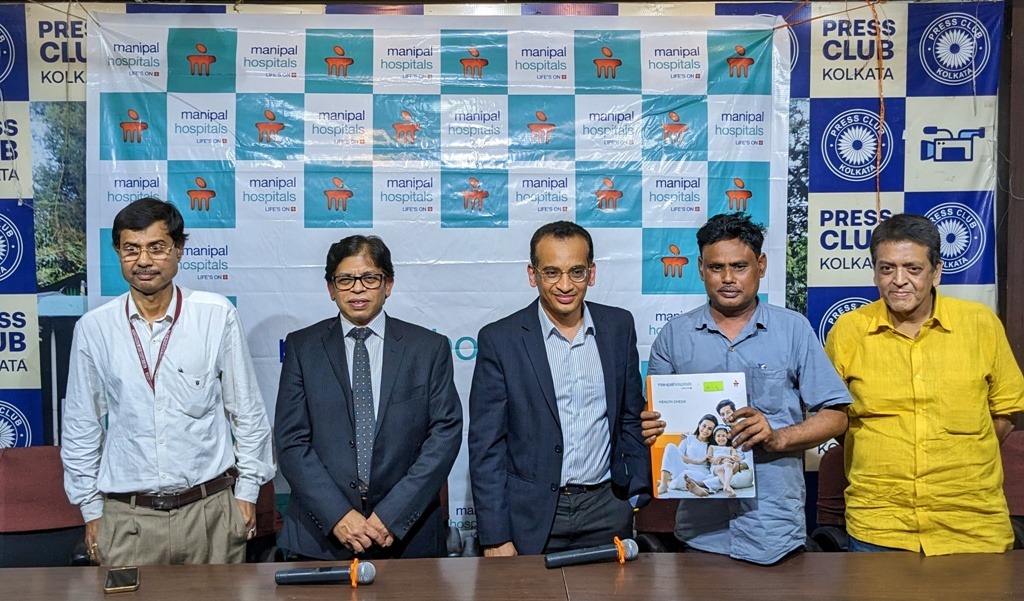Kolkata 18 April 2023: India has seen a rapid rise in cases of liver disease in recent years. Especially in the Eastern and North East region, fatty liver disease is becoming a major cause of concern. Liver disease is spreading like wildfire, with one out of every five persons being impacted. India now accounts for a startling 268,580 liver-related deaths annually (3.17% of all deaths), which accounts for 18.3% of the 2 million liver-related deaths worldwide.
With this in mind, Manipal Hospital Old Airport Road recently organized a press conference in Kolkata on 18th April to address the alarming rise of liver diseases in the Eastern/ North East region of India. The conference featured Dr. Rajiv Lochan, Lead Consultant – HPB and Liver Transplantation Surgery, Manipal Hospital Old Airport Road, and Dr. Raj Vigna Venugopal, HOD & Consultant – Medical Gastroenterology, Manipal Hospital Old Airport Road.
In India, the high prevalence of viral hepatitis, including hepatitis B and C infections, contributes as a major risk factor for liver damage and liver diseases. Another major factor in the development of liver damage is alcohol abuse which leads to fatty liver disease which is very prevalent in the Eastern and North-eastern region. Heavy alcohol consumption causes alcoholic liver disease, while tobacco use increases the risk of liver cancer. The rural settings also bring several infections that can be transmitted through contaminated food, water, and blood products – all of which can lead to chronic liver inflammation and damage over time, needing liver transplants.
Pancreatic diseases such as gastric cancer, duodenal ulcers, pancreatitis, and gallbladder stones can be difficult to diagnose, as symptoms such as acidity can be associated with many different conditions. These diseases are often caused by environmental factors like alcohol consumption, gallbladder stones, poor diet, and lack of physical activity.
Dr. Raj Vigna Venugopal says, “In Eastern/North Eastern India, many patients suffer from the gallbladder and pancreatic disease, with gallbladder and bile duct stones being the most common. Tropical pancreatitis, a condition where stones form in the pancreas, is also prevalent in the region, and its treatment requires a multidisciplinary approach, which our team is well-equipped to provide. Pancreatic diseases are a significant cause of liver problems, as the liver plays a critical role in processing nutrients and filtering toxins from the digestive tract. Therefore, it’s crucial to investigate patients with persistent symptoms to diagnose the underlying cause and provide timely treatment of stones. Failure to do so may lead to severe complications like jaundice and sepsis.”
Speaking at the press conference, Dr. Rajiv Lochan emphasized the need for increased awareness and education about the importance of early diagnosis and treatment. He adds, “Liver cancer is a leading cause of cancer-related death in India, and early diagnosis is critical. Being the largest internal organ, the disease of the liver often goes unnoticed until a patient’s liver is 60-70% damaged. Many patients visit us at advanced stages and require a transplant. We put them often on dialysis and on the waiting list for transplants. Thus, regular screening for hepatitis B and C, as well as regular check-ups for those with a history of liver disease or risk factors, is highly recommended. It is also crucial to adopt a healthy lifestyle and get regular check-ups to prevent the development of liver disease.”
He further highlighted the comprehensive liver care services provided by Manipal Liver Care Unit, the largest liver transplant program in Karnataka. Also, add “With a success rate of 94.5%, our Manipal Liver Care Unit unit has successfully performed 64 transplants in the last year alone, including living donor transplants for patients as young as seven months old and as old as 74 years old. We are the only hospital to do robotic donor hepatectomy and have also done over 70 major liver reactions. The unit is equipped with the latest robotic-assisted technology and is staffed by a team of highly experienced and trained specialists, including hepatologists, intensivist anesthesiologists, surgeons, nurses, and technicians.”
The conference ended with a reminder of the importance of organ donation to increase the number of transplants and save lives. Transplantation is a highly successful treatment for liver disease. Brain-dead donations must increase to meet the demand for liver transplants. Living liver donation is a safe option for healthy individuals to donate a part of their liver to those in need. Healthy people should consider living liver donation as a safe and effective approach to aid those in need of a transplant.
Health Experts Express Concerns Over Rising Cases of Liver and Gastric Diseases in Eastern India
